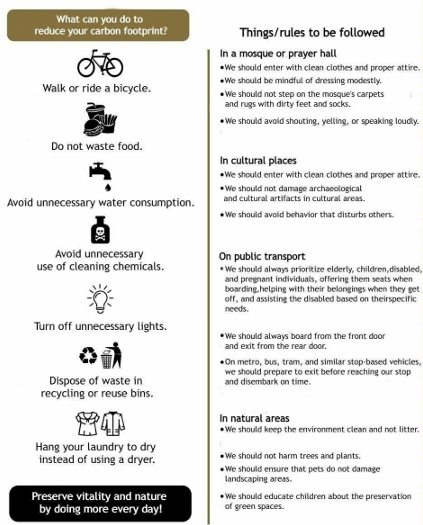Sustainability
Sustainability Report of Antusa Design Hotel & Spa
Istanbul Rail System
Istanbul Rail System Contrast
Istanbul Metro Map
Istanbul Tram Map
Istanbul Bicycle Map
Türkiye CULTURAL HERITAGE SUBJECT PLACES
Access and Information for People with Special Needs
Access and Information for People with Special Needs
In our hotel, accessibility services are partially provided for people with physical disabilities and other special needs.
- Access to the reception and lobby-seating area is provided on the ground floor in accordance with horizontal circulation.
- Hearing Accessibility: Emergency buttons are available with visual lights on the floors. Visual alarms are available on the floors.
- Visual Accessibility: Emergency buttons are available with sounds.
Information About Environmentally Harmful Substances
Dear Guests,
We are delighted to welcome you to our hotel. Our aim is to offer an eco-friendly accommodation experience while raising awareness about environmental protection. In this regard, we would like to share a few important reminders about the personal use of substances that may harm the environment:
-
Sunscreens: Protecting yourself from the harmful effects of the sun is important; however, many sunscreens contain chemicals that can damage marine and aquatic ecosystems. These substances can disrupt the hormonal balance of marine life, particularly those with endocrine-disrupting properties, which may negatively affect the reproductive systems of fish and other aquatic organisms. This can lead to a decline in marine populations and harm biodiversity. Therefore, we recommend choosing organic and environmentally friendly sunscreens. You can find such products in our store or at nearby pharmacies.
-
Insect Repellents: Using insect repellents can make your stay more comfortable and enjoyable. However, some repellents contain chemicals that are harmful to the environment. Please try to choose eco-friendly options when using insect repellents in your room or throughout the hotel. Also, consider the impact on nature when using these products outdoors.
-
Recycling: Please dispose of used sunscreen bottles, insect spray cans, and other packaging materials in the designated recycling bins located in public areas. Recycling is one of our shared responsibilities towards the environment.
Thank you for your sensitivity towards eco-friendly practices. We are committed to working together with you to contribute to a more sustainable future. Should you need any assistance during your stay, please do not hesitate to contact the reception.
CULTURAL HERITAGE
Cultural heritage is a treasure that connects members of a society to their shared past, strengthening solidarity and unity. It preserves the experiences and traditions accumulated throughout history and provides a solid foundation for building the future.
Beyond its universal value, cultural heritage should be protected because it:
-
Offers new learning and development opportunities for younger generations.
-
Creates positive emotions and lasting memories.
-
Inspires creativity and discovery.
-
Deepens our perspective on life and the world.
-
Provides invaluable lessons from the past.
Cultural heritage includes all tangible and intangible values related to our identity, culture, and history. This may include:
-
Tangible heritage: Historic cities, cultural landscapes, monuments, archaeological sites.
-
Intangible heritage: Language, traditions, dance, music, rituals.
By connecting the past and the present, cultural heritage enriches lives spiritually and serves as a strong reference point for shaping the future. Over time, its definition has expanded from focusing only on monuments to encompassing all cultural values of humanity. Today, cultural heritage is closely linked to human rights, cultural diversity, and equality.
According to UNESCO and other international bodies (ICOMOS, etc.), cultural heritage can be classified as:
-
Tangible Cultural Heritage
-
Movable: Paintings, statues, coins, manuscripts, archaeological artifacts.
-
Immovable: Monuments, archaeological sites, historical urban textures.
-
-
Underwater Cultural Heritage: Shipwrecks, submerged ruins and cities.
-
Intangible Cultural Heritage: Oral traditions, performing arts, rituals, customs.
-
Natural Heritage: Natural sites with cultural significance, landscapes, physical, biological, and geological formations.
CODE OF CONDUCT IN CULTURAL HERITAGE SITES IN TURKEY
To enjoy your visit while helping preserve Turkey’s cultural heritage for future generations, please follow these rules:
-
In places of worship: Avoid wearing clothing that exposes shoulders or legs above the knee. Loud talking and playing music are not allowed.
-
Photography: Always ask permission before taking photos or videos of religious leaders, children, or strangers. Unauthorized photography is prohibited.
-
Historical sites: Do not sit, lean, or touch carved or fragile surfaces of monuments or artifacts.
-
Artifacts: It is strictly forbidden to move, relocate, touch, or sell archaeological items.
-
Smoking & alcohol: Respect designated non-smoking areas. Alcohol consumption is prohibited in restricted zones.
-
Children: Do not give money or candy to children, as it encourages begging. Instead, donate to recognized charities.
-
Public decency: Indecent exposure is strictly forbidden and punishable by law.
-
Wildlife products: Avoid buying illegal products or souvenirs made from endangered species.
-
Environment: Littering and polluting nature are strictly prohibited and subject to penalties.


